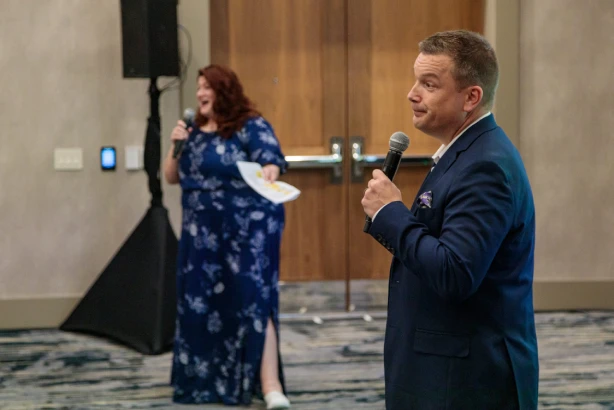By Joe Mull, CSP and Jamie DeRosa |
When it comes to growing a successful speaking business, there’s a critical truth that many speakers learn the hard way: it’s tough to go it alone. We’ve learned valuable lessons about creating a successful partnership, not just from our own journey together, but also from interviewing numerous accomplished NSA members running different types of speaking businesses—from keynote-focused practices to complex training organizations. If you’re interested in growing your team, read on for some well-earned advice and suggestions.
1. How Do I Find a Great Staff Person for My Speaking Business?
Joe: Conventional wisdom says it is dangerous to mix business with friendship or family. My experience has been the opposite. Some of my most successful hires have been people I knew personally, including Jamie. Interestingly, when we interviewed other successful speakers, they consistently noted that their best hires came from their personal networks—not job boards, VA agencies, or overseas contractors. While platforms like Fiverr can work for basic, repeatable tasks, they rarely lead to transformative partnerships. The takeaway here is that if you’re in need of help in your business, you may already know the person you should hire.
Jamie: Before you start searching, you need to know whether you need an expert or an executor. An expert helps create systems and processes from scratch, while an executor implements existing systems effectively. I came in as an executor because Joe had systems in place and needed someone to run them efficiently. Joe also quickly empowered me to amend those systems and create new ones. If you don’t have systems, you might need to start with an expert who can help build them.
Joe: Remember, you get what you pay for. While it might be tempting to hire at the lowest possible rate, cheap rarely creates transformation. I’d rather hire one highly capable person than two entry-level staff who need lots of training and constant supervision. In general, you’ll always have access to better talent if you commit to generous compensation.
2. How Do We Divide Up Responsibilities to Operate Successfully Together?
Jamie: Start by documenting everything you currently do or want to see occur in your business. Then start sorting into two piles: what only you can do and everything else. This will help you identify what can potentially be delegated. Look for ways to group responsibilities together that make sense or draw upon common skills or experience.
Joe: Look at your workflows like a relay race. There are natural handoff points where one person completes their part and passes the baton to the next. For example, maybe you don’t give up sales entirely, but your staff person can qualify leads. Or maybe you still write your social media content, but someone else handles formatting and posting. Overall, think about getting one level up from where you are currently. When you hand work off, don’t assign tasks. Instead, delegate responsibility for outcomes. This grants your team autonomy and prevents you from micromanaging or bottlenecking the work.
Jamie: We use playbooks for all our key processes and a CRM system to manage projects and tasks. We have clear communication channels: scheduled meetings for project work, phone calls or text for urgent matters, email for things that can wait.
3. How Do We Cultivate a Prosperous Relationship Where Everyone Thrives?
Joe: My primary role is creating an environment where Jamie can thrive personally and maximize her considerable talent professionally. This means getting the compensation, benefits, schedule, and work alignment right. It also means mining her for ideas and opinions, so she feels true ownership in the business.
Jamie: What makes this partnership work goes beyond just systems and duties. It’s how Joe treats me and talks about me to others. He never introduces me as “his assistant”—even though I sometimes use that term myself. He calls me his colleague, speaks about me as an integral part of the business, and involves me in every aspect of it. He respects my personal time and family commitments, and he lets me work in ways that suit my style. He’s also deeply committed to evolving my role and making sure it aligns with my skills and interests.
Joe: Trust your team to make decisions, even if they’re not the exact decisions you would make. That’s why, upon hiring Jamie, I made it clear I didn’t just want her to learn my business, I wanted her to learn the speaking business. It’s why I take her to Influence every year.
Jamie: For support staff, you have to truly care about the work the speaker is doing in the world and recognize that this is their name, their legacy, and their livelihood. When I say “our business,” I mean it—even though Joe’s name is on the door. Success in a support role means taking pride in being “the person behind the person.”
The speaker-staff partnership is unique in the business world. It requires trust, clear communication, and a shared commitment to success. When done right, it creates a powerful foundation for growth that benefits everyone involved.
Joe Mull, CSP, is the author of Employalty, the founder of Boss Hero School, and a member of the NSA Board of Directors. Jamie DeRosa has been his Chief Administrative Officer for over four years.
NSA Members can access the full recording of Joe and Jamie’s breakout session, The Staff & Speaker Partnership: Lessons & Advice from a Dynamic Duo, from Influence 2024, in the Digital Vault! Click here to watch the recording. Remember, you must be signed in to your account in order to access the Digital Vault.

